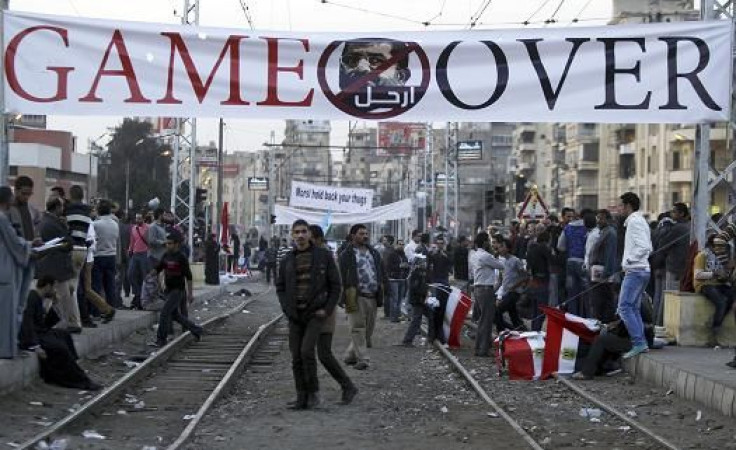Morsi Scales Back His Powers, But Grants Military More Authority To Arrest Civilians

Over the weekend Egyptian President Mohammed Morsi played the moderate negotiator card and attempted to defuse the tense and violent political situation in the country by agreeing to cancel his Nov. 22 decree that originally gave him sweeping powers and immunity from judicial oversight.
However, the opposition parties, who say they and their interests are not being represented by the majority-Islamist Assembly, were not impressed by the concession, as Morsi also failed to cancel the scheduled Dec. 15 popular referendum on the draft constitution.
A spokesman for the main opposition umbrella group, the National Salvation Front, Khaled Dawood told Al-Jazeera that the annulment of Morsi's powers was "relatively meaningless," and that the true goal of the opposition was getting a new draft constitution on the table.
Another spokesman for the opposition named Sameh Ashour told Al-Jazeera that the constitution "does not represent the Egyptian people."
"The National Salvation Front announces its total rejection of the referendum and will not legitimize this referendum which will definitely lead to more strife," he said.
On Sunday in a new power play, Morsi issued a new law granting the army all the arrest powers of the police in order to "maintain security and protect vital state institutions" until Dec. 15. A similar decree passed in June 2012 that gave the military the power to arrest civilians was tossed out within the month after rights activists said it threatened people's rights, Al-Masry Al-Youm reported.
"Despite its limited nature," Egypt News wrote, "the edict will revive memories of Hosni Mubarak's emergency law, also introduced as a temporary expedient, under which military or state security courts tried thousands of political dissidents and Islamist militants."
A military source stressed to Egypt News that this law, like the former law dictating Morsi's judicial immunity, would only be in place until Dec. 15 for security purposes in case of more violent protests.
"The latest law giving the armed forces the right to arrest anyone involved in illegal actions such as burning buildings or damaging public sites is to ensure security during the referendum only," the unnamed source said.
Presidential spokesman Yasser Ali also said that the military will "work within a legal framework" and will return to its usual role after the referendum.
If the new law was meant to finally quiet any protests and let the referendum go ahead peacefully, it's not working. More protests, both pro- and anti-Morsi, were announced for Tuesday, Egypt News reported, heightening the likelihood for more violence.
An anti-Morsi sit-in protest at the presidential palace continued over the weekend, resulting in two wounded soldiers and 10 protesters arrested, Al-Masry Al-Youm reported. Another march on the palace took place on Monday to protest the planned constitutional referendum. Over the weekend 10 people were injured in protests in Beheira, a town north of Cairo, Al Masry Al Youm said, and nine people were arrested in connection with a break-in at a Muslim Brotherhood Headquarters in Moqattam, a neighborhood of Cairo.
On Sunday protesters attempted to shut down the Tahrir metro station, Egypt Independent said, but the Ministry of Transportation said that the subway was running on its regular schedule. Also on Sunday four people in possession of explosive ingredients were arrested near the presidential palace.
On Monday, mass pro-Morsi and pro-Islamist marches took place in Cairo, Alexandria, and Assiut, Egypt Independent said, in support of the Dec. 15 vote, following a similar march on a previous Saturday to support Morsi's now-disavowed constitutional powers.
© Copyright IBTimes 2024. All rights reserved.












